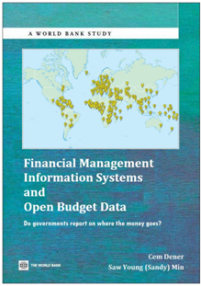Posted by Cem Dener and Saw Young (Sandy) Min [1]

The World Bank Study “FinancialManagement Information Systems and Open Budget Data: Do governments report onwhere the money goes?” (completed in June 2013) and new data set are nowpublicly available from the FMIS Community of Practice or the World Bank PRMPSPublic Finance web site.
Within the last decade,FMIS has become a critical part of improving budget transparency. Disclosure ofpublic finance information to citizens through FMIS platforms can improvetransparency, if the published budget data are accurate, easily accessible andmeaningful. Fiscal transparency can inturn improvetrust in government, if the public interpret the motives for publishing the informationpositively, and an open budget data policy is sustainedfor long periods.Despite all efforts, designing robust FMIS solutions to capture all financialactivities and publish open budget data, and measuring the effects of FMIS onbudget transparency continue to be major challenges.
In order to ensure the reliability of public finance information published on the government web sites, relevant budget data should ideally be obtained from dependable Financial Management Information System (FMIS) platforms and comply with open data standards.
Currently, guidance onpublishing reliable open budget data from underlying FMIS is scarce. This studyis the first systematic attempt to address the following questions about therole and impact of FMIS on the publication of open budget data:
- What are theimportant characteristics of current government web publishing platformsdesigned for the disclosure of budget data?
- Is there anyevidence on the reliability of open budget data published from FMIS?
- Are theregood practices demonstrating the effects of open budget data from FMIS inimproving budget transparency?
- Why is a“single version of the truth” difficult to achieve in the budget domain?
- Whatguidelines can be developed to improve the practices in publishing reliableopen budget data from FMIS?
The conceptual framework used in the study is based onthe following:
- experience gained in the development of FMIS solutionsin all regions for several decades;
- evidence that the reliability and accuracy ofgovernment budget data depends on the capabilities and integrity of underlyingFMIS platforms;
- existence of proven industry standards for publishingopen government data;
- growing demand from citizens for improved budgettransparency, accountability and participation; and
- widespread use of the Internet and web technologiesfor transforming the public sector management.
The study is designed to draw the attention of governments to possible improvements in the accuracy, timeliness, and reliability of budget reporting, simply by publishing open budget data on public finance web sites from underlying FMIS platforms.
The findings of the study are based on an extensivedata set which comprises 20 key and 20 informative indicators and thecharacteristics of FMIS solutions, to measure the current status of a country'sweb platforms for publishing open budget data from FMIS. Data and relevantevidence (web links/URLs) were collected by visiting the government PF websites (mainly Finance Ministries or Departments) in 198 economies, andcollecting evidence on the use of 176 FMIS solutions in publishing open budgetdata.
The findings of this study indicate that good practices in presenting open budget data from reliable FMIS solutions are highly visible in only 24 countries (12%), despite the widespread availability of 176 FMIS platforms used by 198 governments around the world.
Benefitingfrom the FMIS and the open budget data set, about 100 cases from various governmentweb sites in 53 countries were summarized in this study, to highlight some ofthe good practices in different areas of publishing open budget data from FMIS.Based on the observations of this study, the lessons learned from good practicecases and the experiences gained in the development of FMIS solutions and openbudget data portals, the following guiding principles were developed toencourage governments to improve their practices in publishing budget data(these guidelines are described in detail in the study):
- Availabilityof timely and comprehensive budget information;
- Disclosureof details about underlying information systems;
- Availabilityof user defined (dynamic) query and reporting capabilities;
- Publishingreliable and interlinked open budget data;
- Authenticationof the sources of public finance data;
- Improvingthe quality of presentation; and
- Promotingthe effective use of open budget data.
The study shows that, as oftoday, only a small number of governments provide opportunities to thecitizens, civil society groups or oversight agencies for access to reliable,accurate, and meaningful open budget data from underlying FMIS solutions.
Selected cases demonstrate that the innovative solutions topublish open budget data and improve budget transparency can be developedrapidly with a modest investment even in difficult settings, if there is acommitment from the government and a strong interest from the public.
While many governments publish substantial information ontheir public finance web sites, the contents are frequently insufficient toprovide adequate answers to the question “where does the money go?” Therefore,the main conclusion of the study is “What You See Is (Not Always) What YouGet” in government web sites. Additional efforts are needed in manyeconomies to build confidence in the source, reliability, quality andtimeliness of the budget data disclosed by the governments.
The outputs of this study are expected to provide acomprehensive view of the current status of government practices for publishingbudget data around the world, and promote debates about how to improve thesepractices. Several important issues which could be explored in future studies(for example, capturing additional data on the financial activities ofgovernments, and learning more about the perceptions of the users of thesedata) are also discussed in the study.
[1] CemDener (Sr. Public Sector Specialist) and Saw Young (Sandy) Min (Jr.Professional Officer) are staff members of the Governance and Public SectorManagement (PRMPS) practice of the Poverty Reduction and Economic Management(PREM) network of the World Bank.





